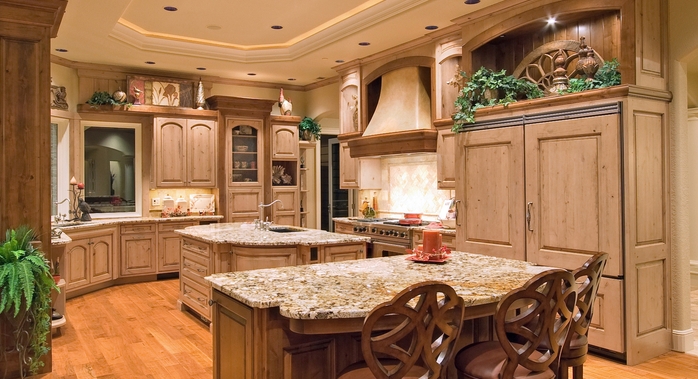Quartz Is the New Granite
 For many years, there was only one word that homeowners thought of when imagining high-end countertops: granite. With its beautiful colors and patterns, granite rose to kitchen prominence by allowing for a look that couldn't be replicated. However, as styles have changed, quartz has risen to contender status for the title of most desired surface. In fact, designers are already saying that quartz has overtaken granite as the most popular countertop material, with requests more than doubling in just ten years. Is quartz just a passing trend or can it stand the test of time?
For many years, there was only one word that homeowners thought of when imagining high-end countertops: granite. With its beautiful colors and patterns, granite rose to kitchen prominence by allowing for a look that couldn't be replicated. However, as styles have changed, quartz has risen to contender status for the title of most desired surface. In fact, designers are already saying that quartz has overtaken granite as the most popular countertop material, with requests more than doubling in just ten years. Is quartz just a passing trend or can it stand the test of time?
If you aren't sure what quartz countertops are, then don't worry; you aren't alone. Rather than being made up of solid sheets of stone (like granite), quartz countertops are manufactured from the mineral quartz. In fact, quartz countertops are also known as engineered stone because they are not naturally occurring. Companies that make the material start by crushing quartz into small pieces, then mixing the crushed mineral with resin and pigment before pressing it into the final engineered stone product.
Natural stones such as marble and granite rose to popularity for the beautiful veining, color patterns, and textures that make each slab one-of-a-kind. However, with the rise of the clean lines and solid colors that define the contemporary design aesthetic, the style that originally made granite so desirable became too busy and irregular to mesh with the rest of the kitchen.
Enter quartz, whose color and pattern can be precisely controlled during the manufacturing process. The clean and consistent color and texture of quartz makes it fit in far better with contemporary design, whereas natural stone lends itself best to a traditional kitchen.
If style was the only thing driving the popularity of quartz, you would be wise to think that it might simply be a passing fad; however, there are also purely pragmatic reasons that engineered stone is a more useful countertop material than granite or marble. For one thing, quartz is harder and more durable than natural stone, which means that it is less prone to scratching, chipping, or cracking. In addition, quartz is less porous and more stain resistant, which make it easier to clean and less likely to become discolored. Finally, quartz does not require sealing or resealing; combined with the ease of cleaning, this makes quartz significantly easier to maintain than granite.
If quartz is so amazing, why doesn't everyone use it? As you might have suspected, any superior product comes with a higher price tag; while granite can typically be installed for $50-$60 per square foot, quartz ranges from $65 per square foot on the low end to over $100 for some designs. Style is also a factor, as even the nicest quartz can't precisely replicate the depth and uniqueness of natural stone.
Keep reading about quartz countertops in this Washington Post article.
- Cheryl Bourland's blog
- Login or register to post comments
 Google+
Google+


 Information Deemed Reliable but Not Guaranteed. CENTURY 21 H.S.V. Realty is licensed in the state of Arkansas. CENTURY 21 and the CENTURY 21 Logo are registered service marks owned by Century 21 Real Estate LLC. H.S.V. Realty, Inc. fully supports the principles of the Fair Housing Act and the Equal Opportunity Act. Each franchise is independently owned and operated. Any services or products provided by independently owned and operated franchisees are not provided by, affiliated with or related to Century 21 Real Estate LLC nor any of its affiliated companies.
Information Deemed Reliable but Not Guaranteed. CENTURY 21 H.S.V. Realty is licensed in the state of Arkansas. CENTURY 21 and the CENTURY 21 Logo are registered service marks owned by Century 21 Real Estate LLC. H.S.V. Realty, Inc. fully supports the principles of the Fair Housing Act and the Equal Opportunity Act. Each franchise is independently owned and operated. Any services or products provided by independently owned and operated franchisees are not provided by, affiliated with or related to Century 21 Real Estate LLC nor any of its affiliated companies.